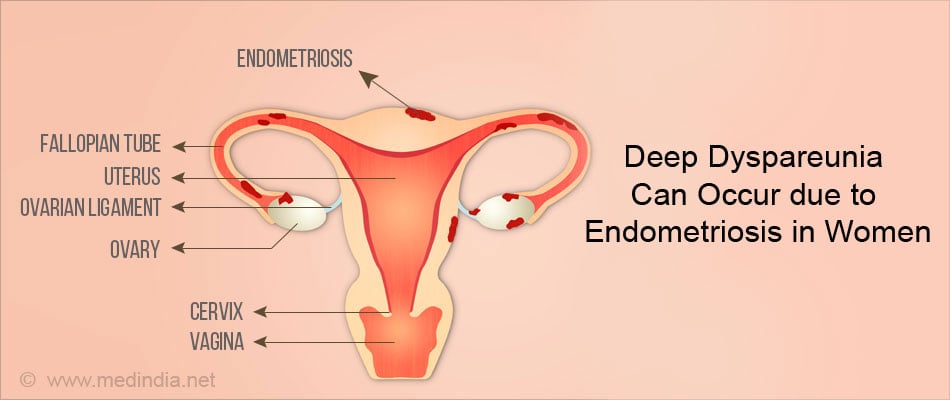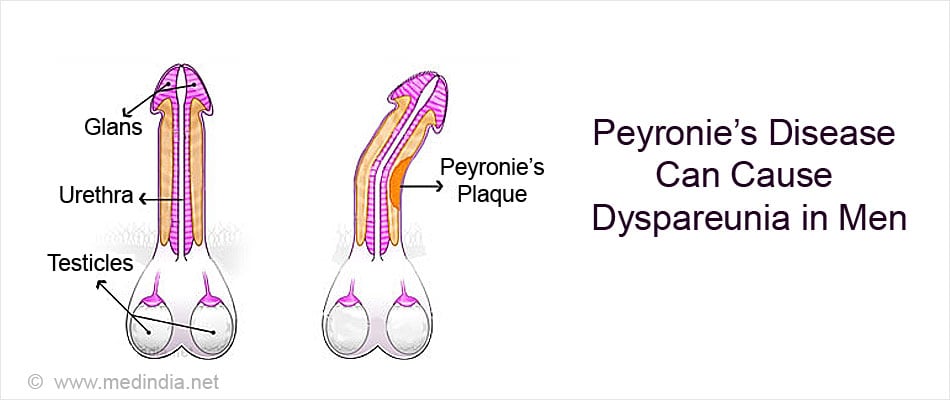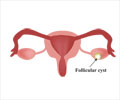- Dyspareunia in Postmenopausal Women: A Critical Review - (http://dx.doi.org/10.1155/2008/269571)
- Pelvic Inflammatory Disease (PID) - CDC Fact Sheet - (https://www.cdc.gov/std/pid/stdfact-pid.htm)
What is Dyspareunia?
Dyspareunia is a type of sexual dysfunction where sexual intercourse is painful. It affects women as well as men who are sexually active, irrespective of their age. The pain may appear during or soon after intercourse. It can cause relationship difficulties in the couple, and necessitates early detection of the underlying cause and appropriate treatment as soon as possible.
A carefully obtained history gives the first pointer to the cause of dyspareunia. The patient should be made as comfortable as possible so that he/she can feel free to talk about the sensitive topic. This is followed by a gentle physical examination to identify the possible cause without making the experience painful for the patient. Several locations on the genitalia are touched with a cotton bud so that the patient can indicate the location of the pain. Diagnostic tests like ultrasound, blood tests and tests on secretions are conducted as necessary to identify an underlying cause.
Quite often, adequate sex education can reduce the symptoms. More serious causes will require specific treatments.
What are the Causes of Dyspareunia?
Dyspareunia can occur due to physical or psychological causes.
Psychological causes: Dyspareunia may occur solely due to psychological reasons in the absence of physical causes. Beside general conditions like anxiety and depression that can cause dyspareunia, psychological causes of dyspareunia include the following:
- Vaginismus is a condition where the vaginal muscles of the female undergo spasm and do not allow the entry of the penis. It is common in younger women due to a fear of penetration. Prior sexual abuse can also cause vaginismus, and should be ruled out.
- Vulvodynia: is a painful condition of the vulva which often has a psychological basis. The vulva constitute the lips of the external genitalia in females. Physical causes should be ruled out before the diagnosis of vulvodynia is made.

- Social/relationship causes: Stress and fatigue may make the woman lose interest in sex, and associate it with pain. Incompatibility between partners may also cause dyspareunia.
Physical causes: Physical conditions could cause dyspareunia in the male as well as the female partner. Besides underlying health conditions like diabetes and thyroid diseases, local conditions affecting the genitourinary tract can also cause dyspareunia.
Physical causes of dyspareunia in females:
Dyspareunia in females may be due to problems in the external genitalia or the vagina, or in deeper structures like the cervix or the pelvis. Dyspareunia due to superficial causes occurs during initial penetration, while deep pain occurs during deep thrusts of the penis.
Causes of superficial dyspareunia include the following:
- Tender rash, scar, ulcers in the external genitalia: These could be due to several causes, like local irritation, sexually transmitted diseases like herpes, autoimmune diseases like lichen planus, or even due to cancer. The condition can be diagnosed through physical examination and confirmed by specific tests. The pain disappears once the underlying condition subsides.
- Vulvar vestibulitis syndrome:Vulvar vestibulitis syndrome is a painful condition of the vestibule of the vulva in the absence of any definite cause for the pain. The vestibule refers to the tissues around the opening of the vagina. Several treatments have been used often with unsatisfactory results.
- Bartholin gland cysts:Bartholin glands are small glands near the opening of the vagina that secrete a lubricant. Cysts may occur in the Bartholin’s glands, which make penetration difficult and painful. The cysts may subside without treatment, or may require antibiotics and drainage if infected.
- Vaginitis or Urethritis: Vaginal infection occurs due to bacteria, a fungus called Candida albicans, or a protozoa called Trichomonas. The symptoms include pain in the vaginal region, itching and presence of a discharge with a foul odor. Inflammation or infection of the urethra, the opening through which urine passes out of the bladder can cause pain during sex. It will also result in pain while passing urine.
- Painful scar following delivery: A vaginal scar may form following trauma to the vagina during delivery or due to a procedure called episiotomy to enable delivery of the fetus. The wound will be tender till it heals.
- Vaginal atrophy:Vaginal atrophy or atrophic vaginitis refers to the thinning of the inner lining of the vagina which occurs following menopause or other conditions where estrogen is deficient, for example, during breastfeeding, following early surgical removal of ovaries or use of certain hormonal medications. The woman complains of a feeling of dryness, burning and itching, along with pain during sex, which can result in loss of interest. The thin vagina becomes less acidic and more prone to infection. The condition improves with local or oral treatment of estrogen. Vaginal lubricants can help to reduce symptoms. Ospemifene is also approved for the condition.
Causes of deep dyspareunia include the following:
Endometriosis, especially of the rectovaginal septum:
Endometriosis is a condition where the tissue lining the uterus is also found in other parts of the pelvis. The tissue bleeds during menstruation and can cause pain and scar tissue formation. Dyspareunia particularly occurs if the septum that separates the vagina from the rectum (lower part of the large intestine) is affected by endometriosis.

Pelvic inflammatory disease and cervicitis:
Pelvic inflammatory disease is an infection of the deeper structures of the reproductive system like the uterus, fallopian tubes or ovaries. The infection may follow an untreated sexually transmitted disease. Infection of the cervix (cervicitis) can itself cause dyspareunia or can travel upwards resulting in pelvic inflammatory disease. Beside dyspareunia, symptoms include pain in the lower abdomen, fever and bleeding between periods.
Retroverted uterus:
A normal uterus is bent forwards over the bladder. In retroverted uterus, the uterus is bent backwards instead of forward and can cause dyspareunia. It is diagnosed during examination by the doctor. Surgery may be necessary to reposition the uterus. In some cases, the ovaries may be prolapsed in the pouch behind the uterus, called the pouch of Douglas, which may further contribute to dyspareunia.
Bladder infection or irritable bowel syndrome:
Infection of the urinary bladder produces deep dyspareunia. The patient also complains of pain over the bladder and while passing urine, along with fever, urgency and more frequent passing of urine. Blood may be present in the urine. Similarly, irritable bowel syndrome, which causes abdominal pain and bowel dysfunction like constipation or diarrhea, can also cause dyspareunia.
Causes of dyspareunia in males:
Dyspareunia in males could be due to the simple problem of an improper technique. Other causes of dyspareunia in males include the following:
- Problems in the penis like tears in the foreskin or Peyronie’s disease It is a condition where the penis is curved due to the formation of scar tissue. In many cases, the condition resolves on its own, but sometimes requires treatment.

- Infections of the urinary bladder as well as the parts of the male genital system like bacterial cystitis and sexually transmitted diseases can cause pain with ejaculation.
How is Dyspareunia Treated?
Treatment of dyspareunia depends on the cause as outlined below:
- For example, bacterial infections will require antibiotics, while fungal infections like Candida infections are treated with topical antifungal medications. Vaginal atrophy is treated with local estrogen application, or with a recently approved drug called ospemifene.
- Simple approaches like use of lubrication during intercourse can reduce pain due to common causes of dyspareunia like vaginal dryness.
- When dyspareunia is due to psychological causes, the following measures may help:
- Adequate sex education can reduce the symptoms.
- Proper communication between the partners and counseling may help to resolve such issues and re-establish sexual contact between partners.
- Vaginal relaxation exercises and pelvic floor exercises (Kegel exercises) may help to reduce pain during intercourse.
- In some cases, prolonged psychotherapy and counseling may be necessary to address psychological reasons for dyspareunia.









